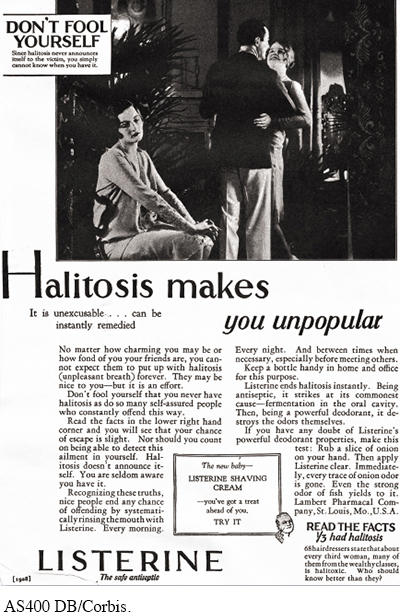The American Promise: Printed Page 656
ANALYZING HISTORICAL EVIDENCE
Advertising in a Consumer Age
Just as American business changed dramatically in the early decades of the twentieth century, so, too, did advertising. Businesses in the New Era sought to attract customers in new and different ways. Before the 1920s, advertising had focused on production. Even small businesses presented themselves as powerful and efficient producers of consumer goods such as stoves and furniture. But beginning in the consumer society of the 1920s, companies sought to teach Americans to judge themselves and others not by what they produced, but by what they bought.
DOCUMENT 1
The Art of Making People Uneasy
In their study of Muncie, Indiana, sociologists Robert and Helen Merrell Lynd found that “advertising is to a business what fertilizer is to a farm” and examined the ways that large-
Advertising is concentrating increasingly upon a type of copy aiming to make the reader emotionally uneasy, to bludgeon him with the fact that decent people don’t live the way he does; decent people ride on balloon tires, have a second bathroom, and so on. The copy points an accusing finger at the stenographer as she reads her Motion Picture Magazine and makes her acutely conscious of her unpolished finger nails, or a worn place in the living room rug, and sends the housewife peering anxiously in the mirror to see if her wrinkles look like those that made Mrs. X—
Source: Robert S. Lynd and Helen Merrell Lynd, Middletown: A Study in Contemporary American Culture (New York: 1928), 47, 82.
DOCUMENT 2
Unmasking Advertising
Frederick Lewis Allen, a journalist and historian, was an acute observer of contemporary life. In his enormously popular Only Yesterday, published only two years after the 1920s ended, he contemplates an advertising campaign based on anxiety about bad breath.
By far the most famous of these dramatic advertisements of the Post-
Source: Frederick Lewis Allen, Only Yesterday: An Informal History of the 1920s (New York: 1931), 144–

DOCUMENT 3
“Messenger to the King”
Not every observer of the avalanche of new advertising found it objectionable. William Chenery, editor and publisher of Collier’s, a national magazine, sang advertising’s praises in this 1930 article in his magazine.
Advertising, essentially, is the awakening of human desire. There is no stronger force in this new world of ours.
The successful advertisement makes you crave new things. The motive is frankly commercial but the consequences reach far beyond trade. . . . The byproducts of the [advertiser’s] efforts have had prodigious effects upon our opinions, our standards of taste, our habits, and even upon our picture of a good life.
We arise in the morning and we bathe. Why? Merely because soap makers have taught us the importance of cleanliness. . . .
Beards and even mustaches have gone out of fashion because razor manufacturers persuaded us to shave.
We clean our teeth because toothpaste manufacturers have made us believe in the importance of oral hygiene. They have saved us from more aches than the dentists could cure.
Our breakfast habits are the results of the teaching of food manufacturers. The old heavy American breakfast has gone the way of the hoop skirt. Our health is better. Advertising did it.
The clothes we wear, the houses we live in, the furniture we use, our very conception of a home is the product of advertising. . . .
If journalism is the little sister of literature, advertising began certainly as the Cinderella of selling. Now it is the great motive force in our commercial life. It is the life blood of public demand. Our material civilization has been made possible by it.
Source: William Chenery, “Messenger to the King,” Collier’s, May 3, 1930.
Questions for Analysis
Analyze the Evidence: According to the critics—
Recognize Viewpoints: How might William Chenery’s job have helped shape his positive opinion of advertising? How might the other writers included here dispute his argument?
Consider the Context: How did the rise of mass production translate into the rise of mass advertising and mass consumption?